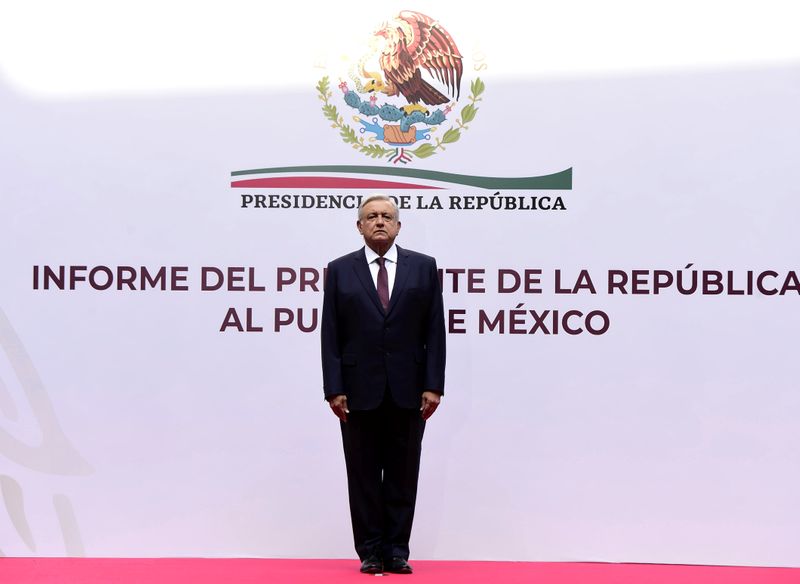By David Alire Garcia
MEXICO CITY (Reuters) - Mexico's leftist president may offer some concessions to pro-market voices in his cabinet when he unveils a $13.5 billion energy plan this week, but likely not enough to attract major investment or to revive the fortunes of state-run Pemex.
President Andres Manuel Lopez Obrador is under pressure to relieve Mexico's $1.2 trillion economy from the strain of a partial shutdown to contain the coronavirus pandemic, at a time when the vital energy sector has also been hit by the most severe oil price rout in two decades.
On Sunday, Lopez Obrador said he would present a long-awaited energy plan in coming days, including $13.5 billion in public and private investment. That headline figure was far lower than a $92 billion proposal made by the private sector for new investment projects.
While energy analysts say Mexico's oil industry is in desperate need of private money to halt a decline in output, Lopez Obrador balked at a liberalization of the energy sector approved by his centrist predecessor Enrique Peña Nieto, and has halted oil auctions open to private producers.
Two sources familiar with the energy plan, but not authorized to speak publicly, said the fight between resource nationalists in the cabinet, led by Energy Minister Rocio Nahle, and a pro-business faction, headed by chief of staff Alfonso Romo, has grown louder since last month's oil price crash.
At stake is the future of a Mexican oil industry that provides about 15% of government revenue but only pumps half the crude it did 15 years ago, as state oil company Pemex struggles under a mountain of debt greater than any other oil major's.
Nahle told Reuters that the government would offer the private sector more attractive service contracts to help squeeze more oil from Mexico's mature fields and to garner investment for its aging refineries.
"We looked for a very, very interesting plan to attract investment and that investors see as attractive so they can invest in viable projects and make profits as well," she said in a recent interview.
However, the minister ruled out auctioning any new oil acreage to private companies - the top priority for private sector investors. She also dismissed suggestions Pemex should curb output at fields where lifting costs are below current prices, or pause an $8 billion Pemex refinery under construction.
"We have to protect our energy security. We are focused on the recovery of our oil company," Nahle said. "And at the same time coexisting and co-investing with private enterprise. I believe we can do both, in a balanced way."
PRESSURE GROWING
The two sources who spoke to Reuters described a stalemate, with Nahle, Romo and Pemex CEO Octavio Romero awaiting a final decision from the president, who the sources said has been deeply shaken by the precipitous fall in crude markets.
"They won't move until his instructions arrive," said one of the sources.
Even though the government has stuck to its plan of saving Pemex through capital injections and a new focus on refining - a long-time and massive money loser for the company - some insiders think a change of course is inevitable to keep the indebted company afloat.
Pemex lost $18.3 billion last year even before the current price crash, as financial debt totaled more than $105 billion, and is likely to suffer more credit downgrades this year.
"A big budget cut is coming," said one official with Pemex's exploration and production unit on condition of anonymity as he was not authorized to comment.
The official said drilling would stop at some newly approved wells, including at some of the company's priority shallow water projects - appearing to contradict Nahle's prediction.
In a possible indication that some projects will be mothballed, the government last week backed away from a goal of boosting oil output this year, forecasting 2020 production would be flat at around 1.7 million barrels per day.
George Baker, the Houston-based publisher of Mexico Energy Intelligence, said past attempts to lure big investment with oilfield service contracts had failed and that Lopez Obrador's focus on building an energy plan around Pemex is a mistake.
"Any plan that he has that is Pemex-centric will show that he's not yet serious about engaging with the international investment community," said Baker.
PRICE WAR
Taxes on Pemex accounted for about 15% of government revenues last year when the average price for its export mix, its main revenue-earner, stood at about $56 per barrel.
Last week, Mexico's Maya heavy crude, the most important component in the mix, averaged $12.75 per barrel, according to S&P Global Platts data.
The government has hedged all of its oil revenue for this year's budget at an average of $49 per barrel, but Pemex is exposed to market prices for most of its crude production.
According to estimates from Victor Gomez Ayala, senior economist at financial firm Finamex, Pemex will need to find an additional $330 million for every dollar the average falls below $49 per barrel to maintain its current spending.
Pemex is also struggling to sell its flagship Maya heavy crude as Saudi Arabia and other producers offer steep discounts.
Nahle described this week's plan as "phase one" of the government's energy investment plan, and she appeared to leave the door ajar for new joint venture tie-ups with Pemex, which so far Lopez Obrador has resisted.

"Pemex, as a company, will decide if that is in its interests or not," she said.